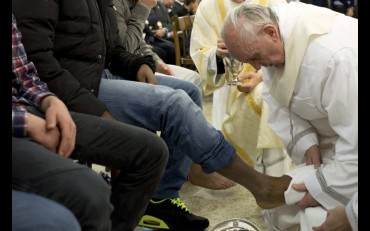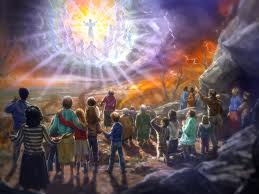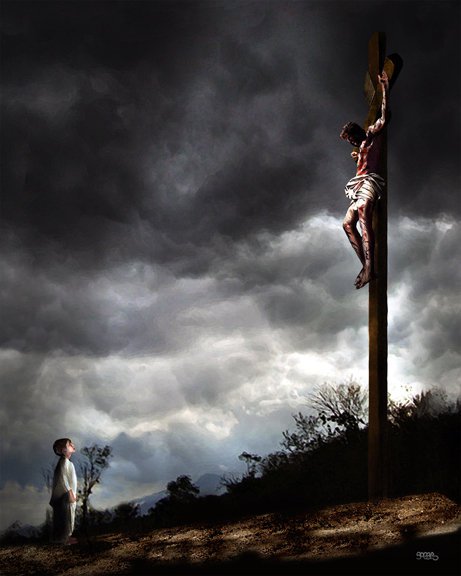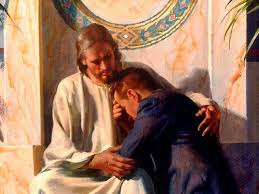
– 26-11-2023-
The Feast of Christ the King of the Universe
– 34th Sunday. Yr A
Gospel text: Matthew 25:31-46
vs.31 Jesus said to his disciples:
“When the Son of Man comes in his glory, escorted by all the angels, then he will take his seat on his throne of glory.
vs.32 All the nations will be assembled before him and he will separate men one from another as the shepherd separates sheep from goats.
vs.33 He will place the sheep on his right and the goats on his left.
vs.34 Then the King will say to those on his right hand,
‘Come, you whom my Father has blessed, take for your heritage the kingdom prepared for you since the foundation of the world.
vs.35 For I was hungry and you gave me food; I was thirsty and you gave me drink; I was a stranger and you made me welcome;
vs.36 naked and you clothed me, sick and you visited me, in prison and you came to see me.’
vs.37 Then the virtuous will say to him in reply,
‘Lord, when did we see you hungry and feed you; or thirsty and give you drink?
vs.38 When did we see you a stranger and make you welcome; naked and clothe you;
vs.39 sick or in prison and go to see you?‘
 vs.40 And the King will answer,
vs.40 And the King will answer,
‘I tell you solemnly, in so far as you did this to one of the least of these brothers of mine, you did it to me.’
vs.41Next he will say to those on his left hand, ‘Go away from me, with your curse upon you, to the eternal fire prepared for the devil and his angels.
vs.42 For I was hungry and you never gave me food; I was thirsty and you never gave me anything to drink;
vs.43 I was a stranger and you never made me welcome, naked and you never clothed me, sick and in prison and you never visited me.’
vs.44 Then it will be their turn to ask, ‘Lord, when did we see you hungry or thirsty, a stranger or naked, sick or in prison, and did not come to your help?’
vs.45 Then he will answer, ‘I tell you solemnly, in so far as you neglected to do this to one of the least of these, you neglected to do it to me.’
vs.46And they will go away to eternal punishment, and the virtuous to eternal life.”
(Picture above right: Michelangelo’s The Last Judgement in the Sistine Chapel, The Vatican, Rome)
***************************************************************
We have four commentators available from whom you may wish to choose . Scroll down to the required author.
Michel DeVerteuil: Lectio Divina /the Sunday Gospels – Year A
Thomas O’Loughlin: Liturgical Resources for the year of Matthew
John Littleton : Journeying through the Year of Matthew
Donal Neary : Editor of the Messenger
****************************************
Michel DeVerteuil
Lectio Divina with the Sunday Gospels- Year A
www.columba.ie
General Comments
For today’s feast of Christ the King, the Church chose a gospel passage which is the final teaching of Jesus’ public life according to St Matthew; it therefore completes the lectionary’s “continuous reading” for the year. Meditating on this passage in the light of the feast requires two clarifications.
Modern Western culture does not predominatively have kings – or queens. The few left who do, do not exercise any real power; they play ceremonial roles and we associate them with pomp and pageantry. In the biblical culture, however, kings were leaders of their communities. They were “judges” in the sense that they set moral standards for the community. Rightly then, today’s gospel reading celebrates Christ’s kingship as an act of “judgement“.
The second clarification is that Jesus is a special kind of king – his way of “judging” is very different from what prevails in the world. This is what the feast celebrates – the “good news for the poor” of Christ’s (God’s) standards of judgement. It is also a call to repentance addressed to us as individuals and as a Church, since our “judgments” (in word or action) are often far removed from those of Jesus.
As always in the bible, Christ’s kingship is taught not in abstract language but through a dramatic story – an event we are invited to identify with.
 This story is of a future, final judgment – like the parable of two weeks ago, “the kingdom of heaven will be like this“. Our present judgments are never “final“, the final one will occur only “when the Son of Man comes in his glory escorted by all his angels“. For now, all we can be certain of is that God’s judgement will surprise us, and so we are humble in his presence. To the extent that we are complacent and self-satisfied we are not ready for God’s judgement.
This story is of a future, final judgment – like the parable of two weeks ago, “the kingdom of heaven will be like this“. Our present judgments are never “final“, the final one will occur only “when the Son of Man comes in his glory escorted by all his angels“. For now, all we can be certain of is that God’s judgement will surprise us, and so we are humble in his presence. To the extent that we are complacent and self-satisfied we are not ready for God’s judgement.
St Paul sums up our attitude:
“There must be no passing of premature judgement. Leave that until the Lord comes: he will light up all that is hidden in the dark and reveal the secret intentions of the human heart” (1 Cor 4: 5).
This is not the whole picture, however. Today’s passage invites us to remember the temporary and fleeting “judgement moments” we may have experienced:
*we became seriously ill
* our marriage broke up
* we fell into a fault we thought we would never succumb to
* our country, our world experienced national disasters, floods, famines, civil wars, epidemics or pandemics
These experiences are authentic encounters with God in that they reinforce the teaching of the entire bible that when God comes into the world “the lowly are lifted up and set in the company of princes”, “the barren wife bears countless children”, “the last come first“.
– We thought that certain people were the “least“. Now we realise they were sacred, divine in fact, since what we did to them we did to Christ and what we refused them we refused to Christ.

Pope Francis washes the foot of a prison inmate during the Holy Thursday Mass of the Lord’s Supper at Rome’s Casal del Marmo prison for minors.
– We thought that we met Christ by doing extraordinary things. Now we realise that it was in very mundane things, i.e. giving food to the hungry, drink to the thirsty, clothes to the naked, visiting the sick and those in prison.
– We thought we met Christ in moments of prayer or in holy places. Now we realise that we meet him when we feed and clothe those in need, when we visit hospitals and prisons.
– We realise that leadership in religious organisations counts for nothing before God.
In his judgement, the only thing that counts is ‘humble service.‘
As always in the bible, the judgement causes two reactions and we have experienced them both at different times:
* wonderful relief at knowing we were right. Good actions which we (and others who had power over us – “chief priests and elders”) looked on as trivial were in fact truly great, recognised in the presence of God (and of all right thinking people) and never to be forgotten. It is a homecoming experience, we “take for our heritage the kingdom prepared for us since the foundation of the world”.
*terrible sadness when we realise that we have missed the boat – like the foolish bridesmaids of two weeks ago. We are consumed by remorse, “the eternal fire“. The contrast with the virtuous is striking; for them it was a homecoming, whereas these feel deep alienation – the fire was “prepared for the devil and his angels”, they “go away” to their fate.
As on the past two Sundays, we remember the context of this teaching. Jesus’ imminent crucifixion would be a “judgement moment” in that it broke down all barriers:
– the humblest person there was the Son of God,
– the holy place was outside the city,
– the person of faith was a Roman soldier.
In those degrading circumstances, the “son of man” was present “in his glory escorted by all the angels, with all the nations assembled before him“. We remember experiences which seemed to be disasters but in fact were judgement moments showing us how wrong our values were.
We note once more the down-to-earthness of Jesus’ judgement. The sign that we have met him is that we discern between good and evil, “goats and sheep are separated; one placed on the right, the other on the left”.
His teaching is not airy fairy – “you must live with the consequences of your actions“. “Good news” is implied however – “other chances will arise so don’t miss out next time”.
Scriptural Reflection Prayers
“It is we who lose when we allow the venom of hatred and revenge to circulate through our spiritual veins.” ….Archbishop Pantin of Port of Spain, Trinidad
 Lord, forgive us that in times of great crisis – national or personal – we become vengeful,
Lord, forgive us that in times of great crisis – national or personal – we become vengeful,
wanting to consign people to the eternal fire
prepared for the devils and his angels.
Help us to wait for the day when the Son of Man comes to his glory, escorted by all the angels, takes his seat on his throne of glory, with all the nations assembled before him, and separates good from evil, as the shepherd separates the sheep from the goats.
Lord, we tend to think of you sitting passively on your throne, indifferent to what is going on in the world.
But whenever we enter your presence, it is always an experience of discernment, of goodness being put on one side of you and evil on the other, like sheep being separated from goats.
Lord, we thank you for those beautiful moments when we relieved someone’s pain.
– Someone was hungry and we gave them food,
– thirsty and we gave them drink; – we clothed someone naked,
– made a stranger welcome; – visited one who was sick,
–went to see a prisoner and/or their family.
Quite suddenly it dawned on us that we had experienced a blessed moment,
had a personal meeting with you and had come to the best of ourselves;
we had taken possession of a kingdom that had been prepared for us since the foundation of the world.
Lord, part of each one of us has no compassion,
– can see the hungry and never give them food,
– see the thirsty and never give them anything to drink,
– never wants to make strangers welcome, or clothe the naked,
– or visit the sick and those in prison.
Sometimes this part of ourselves seems very influential,
but it is not the truth of ourselves;
it is evil, destined for the eternal fire prepared for the devil and his angels.
Lord, a moment of grace is like coming home, entering a kingdom prepared for us since the foundation of the world. Thank you, Lord.
“We can never really love others unless we feel a certain reverence towards them.”
…Card J Newman
Lord, help us to move from helping the poor with condescension to experiencing that to do a favour to one of the least of our brothers and sisters is to be given the privilege of doing it to you.
Lord, we thank you for those who are grateful to us. So often all we did was to help them in some basic way, but they make us feel that we looked after you and now deserve to be put on your right side,
Lord, we have to make a journey in our relationship with you. At first, we think that we will draw close to you by doing plenty of “holy” duties. Then we realise that you want us to be free and spontaneous, just to be compassionate, and leave judgement to you.
“The abdication by the Christian churches of one whole department of life, that of social and political conduct, as the sphere of the powers of this world and of them alone, is one of the capital revolutions through which the human spirit has passed.” … R.H. Tawney
 Lord, we pray that your Church will always proclaim Jesus’ teaching
Lord, we pray that your Church will always proclaim Jesus’ teaching
that when the Son of Man comes in his glory, escorted by all the angels,
to take his seat on his throne of glory
with all the nations assembled before him,
his judgement will be based on whether the hungry were given food
and the thirsty were given drink,
whether strangers were made welcome,
the naked clothed, and whether the sick and those in prison were visited, because when these things are done to the least of his brothers and sisters they are done to him.
“Christ himself wishes to be identified with and recognised in every refugee.” …Pope St John Paul II.
Lord, we thank you for those who make strangers to their country welcome.
In doing so, they are welcoming you.
“Why can’t Christians see the poor wounded part inside themselves? Can they not see Jesus there? Why do they always have to see Jesus outside themselves?”
….Carl Jung
Lord, we thank you for those people who have helped us to see that this passage speaks
*of what is naked within ourselves and needs to be clothed,
*of the stranger in us needing to be made welcome,
*the sick and the prisoner within us who needs visiting.
*********************************************************
Thomas O’Loughlin
Liturgical Resources for the Year of Matthew
www.columba.ie
Introduction to the Celebration
Way back in January we began the year by celebrating the Baptism of Jesus when a voice was heard calling him ‘the beloved Son‘. During the year we have greeted Jesus under all the views of him we find in the gospels. Now today, at the end of the year, we greet him with the all-embracing title: Jesus Christ, Universal King.
 The Christ is the one who will gather us all together at the end of time, the one who will judge the living and the dead, and then present his kingdom to the Father. In our pilgrimage of faith that kingdom of justice, truth, and peace is to be our beacon, and Christ our guide. But before we join Christ in his banquet, we must ask pardon for the times when we followed other paths and other ways, when we listened to false prophets of greed and materialism, and for when we have failed to work for the coming of the kingdom
The Christ is the one who will gather us all together at the end of time, the one who will judge the living and the dead, and then present his kingdom to the Father. In our pilgrimage of faith that kingdom of justice, truth, and peace is to be our beacon, and Christ our guide. But before we join Christ in his banquet, we must ask pardon for the times when we followed other paths and other ways, when we listened to false prophets of greed and materialism, and for when we have failed to work for the coming of the kingdom
Homily Notes
1. One of the most lyrical passages in the whole liturgy is the ‘preface for this day’. It was produced in the immediate aftermath of the First World War, and appeared with the institution of this feast in 1925. It is a masterpiece of theology that, in many respects, anticipated the theology of the liturgy of the Second Vatican Council. However, it is rarely heard, and when it is heard each year on this feast it can be lost, as many prefaces are, as it is just a brief interlude between the bustle of the’ offertory’ and the more serious-minded tone of the prayer after the Sanctus.
At the end of the liturgical cycle there is a note of reflection, on what has happened and on the End-times, in today’s liturgy and this can be fostered by replacing a preached homily with a reflection on this preface.
2. The simplest way is just to draw it to the assembly’s attention, and then just read through it slowly, line-by-line.
3. One can add a commentary, but care has to be exercised that commentary does not take over from reflection. There is a thin line between the helpful comment aiding reflection and the series of glosses on the way towards being a lecture.
4. Such a reflection, given the nature of the text, has an additional effect: it produces a nice, quiet way to end the Year.
Next week the liturgy will be all agog as everyone starts thinking of Christmas.
****************************************************************
John Littleton
Journeying through the Year of Matthew
www.Columba.ie
Gospel Reflection
What do we think about how we will be judged when we die and about the general judgement at the end of the world? Do we, for example, believe in heaven as a state of eternal happiness in God’s presence and in hell as a state of eternal alienation (and, in this sense, damnation) from God? These may seem rather gloomy questions but they are the questions that must be asked after reading the parable about the Son of Man coming to separate the virtuous from the wicked as the shepherd separates sheep from goats.
 Many people no longer believe in life after death or in the existence of heaven. They insist that earthly life is the only life and that there is nothing after death. Some Christians — who are meant to believe in life after death — query the existence of hell. They argue that if God is all loving and compassionate, then God will save everyone from the consequences of their sins and ensure that they will be in heaven. How could such a merciful God not save everyone?
Many people no longer believe in life after death or in the existence of heaven. They insist that earthly life is the only life and that there is nothing after death. Some Christians — who are meant to believe in life after death — query the existence of hell. They argue that if God is all loving and compassionate, then God will save everyone from the consequences of their sins and ensure that they will be in heaven. How could such a merciful God not save everyone?
However, there is a fallacy in this argument. It disregards the uncompromising words spoken by Jesus in the parable. This argument also ignores a basic Christian belief regarding free will. While God certainly desires that all people would share eternity in heaven, he respects our freedom and accepts the outcomes of our choices and decisions.
If we knowingly and freely ignore the fundamental needs for sustenance, kindness, well-being and friendship of other people we meet, we are making a statement about our selfishness and self-interest. In deciding not to respond to these people, we are also deciding not to respond to God who lives in them. We disregard those people who need our help and encouragement.
 In effect, we are judging ourselves to be self-centred rather than God-centred, to be uncaring and indifferent. If such practices continue throughout our lives without repentance, we will be judged accordingly when we die. If we opt not to respond to God during this life, then why would we opt to respond to God in the next life? Thus we will be our own judges on the day of general judgement.
In effect, we are judging ourselves to be self-centred rather than God-centred, to be uncaring and indifferent. If such practices continue throughout our lives without repentance, we will be judged accordingly when we die. If we opt not to respond to God during this life, then why would we opt to respond to God in the next life? Thus we will be our own judges on the day of general judgement.
In other words, we are largely in control of our own eternal destiny. Blaming God or God’s harsh judgement will be futile if heaven is not to be our final destiny. We will not be able to claim astonishment about our ultimate fate because we ourselves will already have determined that fate by our attitudes and behaviour during this life.
In summary, there are two basic types of people in the world: those who care about God and others, and those who focus their attention solely on themselves. To which type do we belong? Jesus taught that when we help the needy we are actually helping him. That is why when Mother Teresa of Calcutta was asked how she could touch a disease-ridden man, she said that she was not touching him but touching Jesus.
Are we ready for judgement? If we consistently ignore Christ in this life, on the Last Day he will be consistent and treat us likewise. Remember that while our salvation depends on the grace of Christ, it also depends on our choices during this life.
For meditation
He will take his seat on his throne of glory … and he will separate men from one another as the shepherd separates sheep from goats. (Mt 25:32)
*******************************************
Donal Neary
Gospel Reflections For Sundays Year A
www.messenger.ie
The ‘I’ word!
We know this story well. The most important word in it is ‘I’. Jesus identifies himself with the people he is talking about. He doesn’t say people were in prison and you visited them, or sick or naked. He says I who am in prison, sick or naked. It’s even more than being a brother or sister of Jesus. He identifies with each of us especially in need. Created as we are in the image of God, Jesus sees right through us to see God. God is the divine life of God in each person.
That makes the difference. We don’t help the needy person only because he or she is needy, but because each is in the image of God and Jesus sees him or her and says ‘that’s me.’
This can be a programme for life. For the young – can you make a decision for your life that includes deep care from your love of those in need? For those in their busy lives already and who have chosen their way – how can you show deep care for those in need. For the elderly – can you pray for those in need each day and encourage those more active to care for them?
Did you feed the hungry,
give drink to the thirsty,
welcome the stranger,
care for the sick and
visit the prisoner?
Lord Jesus, may your kingdom come –
The reign of equality, justice, peace and love.
***************************************************